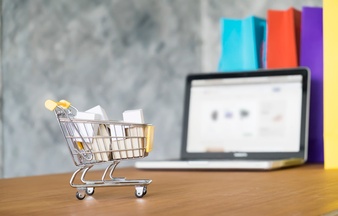ERP has become a requirement for retail businesses regardless of the company’s size. With the increase in competition, enterprise resource planning or ERP software has become essential for businesses to adapt to evolving customer needs.
It’s a set of customizable software that allows companies to seamlessly integrate and manage all of their major processes, such as managing multiple stores, regularly moving stock and pricing adjustments, discounts, deals on goods a many more. It can be lengthy and difficult to manage by hand, but an ERP program gives quick, easy and reliable solutions for managing required to run the business more efficiently.
It is among the biggest industries in the world that employs many millions. It is also among the most technologically-savvy sectors in the world. According to research, the global retail market is expected to rise by 26.7 trillion US dollars in 2022. The rapid growth in retail sales is due to the rise of e-commerce and globalization. No matter how small or big retailers, they all need to adapt to the ever-growing customer demands. Effective retailing software can assist a retailer in achieving the top spot within their market. This article will discuss the various kinds of software for retail and how retailers can pick the right software for their requirements.
Here are seven important advantages of ERP in retail businesses.
Reliable Business Information
Information about business operations is gathered from different divisions, such as purchases, inventory, sales, and other procedures. Accurate, real-time and pertinent information allows management to make swift and well-informed business-related decisions.
An ERP system stores all this information in a single application. A single database allows easy access to the information and assists companies in planning better for changes in demand, competition and other sudden disruptions. Also, better planning results in better control, which helps businesses make more profit.
Better Inventory Management
Inventory is essential for retail businesses. Controlling it will help the stock to be sufficient to meet expectations while eliminating excesses. An ERP software solution addresses this problem extremely thoroughly. It stores precise details on each item in stock so that customers know precisely what products are in the inventory and which items need to be replenished. Additionally, the software aids in forecasting demand by studying patterns in customers’ buying habits in the past, making it possible to alter your inventory to meet future demand.
Integrating Multiple Channels
Retailers usually require multiple channels working simultaneously to ensure that operations are run smoothly within their store. An ERP system brings all these channels into one platform that allows departments to share data in real-time. It is no longer necessary for one department to inform another department each time there’s an update. Employees have access to the information at any time they require. The latest technology benefits companies through more efficient communication.
Enhance Operational Efficiency
Software for Retail ERP lets businesses capture the information, store and manage data using an automated system to streamline and organize day-to-day tasks and decrease the time-consuming manual effort involved to perform these repetitive tasks. This solution assists companies in increasing their efficiency, ensuring that goals are met in time, thus reducing operational expenses.
Automate Sale & Payment Recording
POS systems automatically track the details of sales transactions and eliminate the need for extra effort and mistakes that happen when the job is performed manually.
The most modern retail ERP software integrates to its POS tool, making sales transactions more efficient and less complicated. Using this software, retailers can reduce the number of times customers have to wait to bill their purchases. In addition, it also gives live information. All transactions are instantly reported to the central ERP, allowing the managers to supervise the operations occurring in the various retail outlets.
Augment Customer Management
Customers are essential to the success of any retail business. An ERP system equipped with tools to manage customers can help retailers overcome gaining and keeping customers.
As previously mentioned, the ERP system records all the information customers have purchased, including their purchases. The data is used to study shoppers’ buying trends, allowing you to develop deals tailored to their preferences and give them the most personalized shopping experience.
Effortless Pricing and Discount Management
A retail business requires a constantly changing pricing system. But keeping track of the process is an exhausting task. To do this, you’ll need an ERP system that can streamline the recording of the cost of items and the discounts on them, which makes the process effortless.
It is not a stretch to suggest that one ERP system is essential to survive today’s intensely competitive market. The software comes with options that will enhance the capabilities of retail businesses and give them an edge over their rivals.
The Closure
The use of a retail software program isn’t just a necessity but an essential requirement in the competitive world of the retail sector. When choosing the retail software, retailers must ask the chosen retail software development firm to make sure that the software is simple to use by customers and employees and compatible with existing hardware. A well-designed retail software program can be a huge benefit for the retailer. Retailers searching for a custom-built retail application could also contact the best custom software development firms to find a successful solution and higher return on investment.
